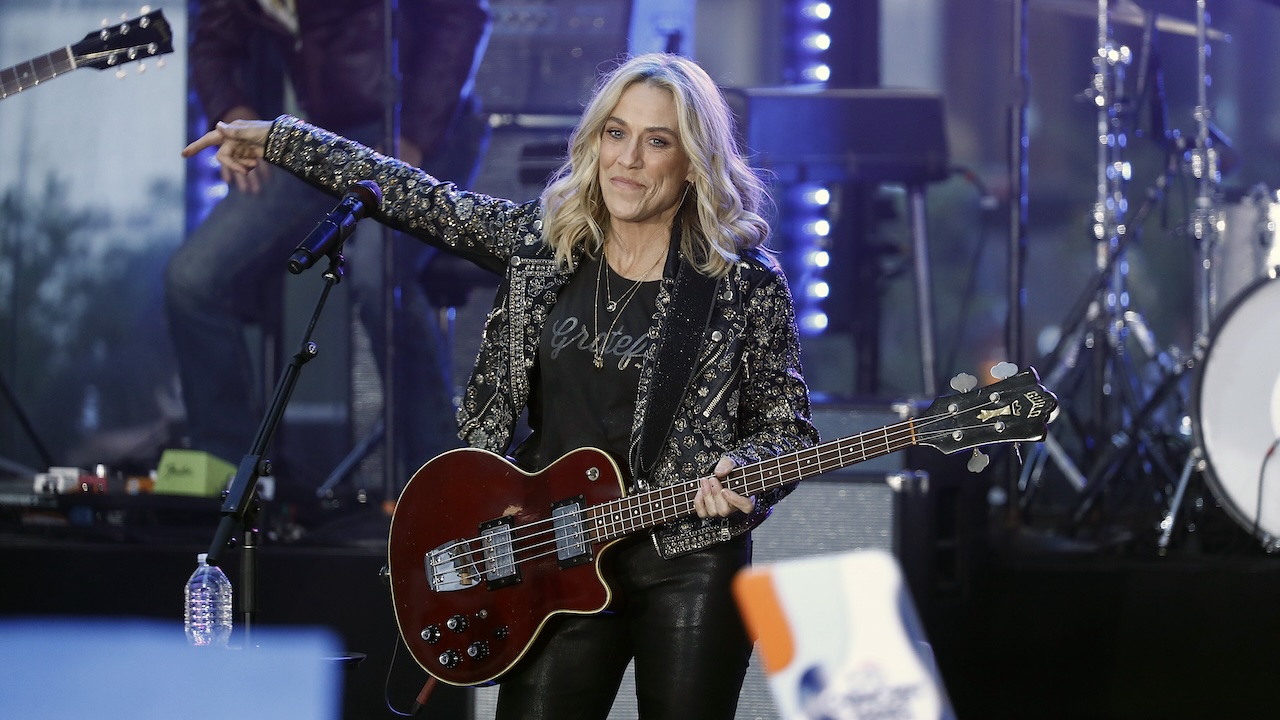“Billy Gibbons pulls out this big-ass yellow 17-string bass and he’s like, ‘Okay, we’ll play it for a song, right?’” ZZ Top’s Elwood Francis on teching for Joe Perry, lying to Steve Vai – and the curse of playing that viral 17-string bass
The gear-trashing DIY enthusiast once had to choose between Vai and Joe Perry, before being fired and rehired by Guns N’ Roses – in a matter of days
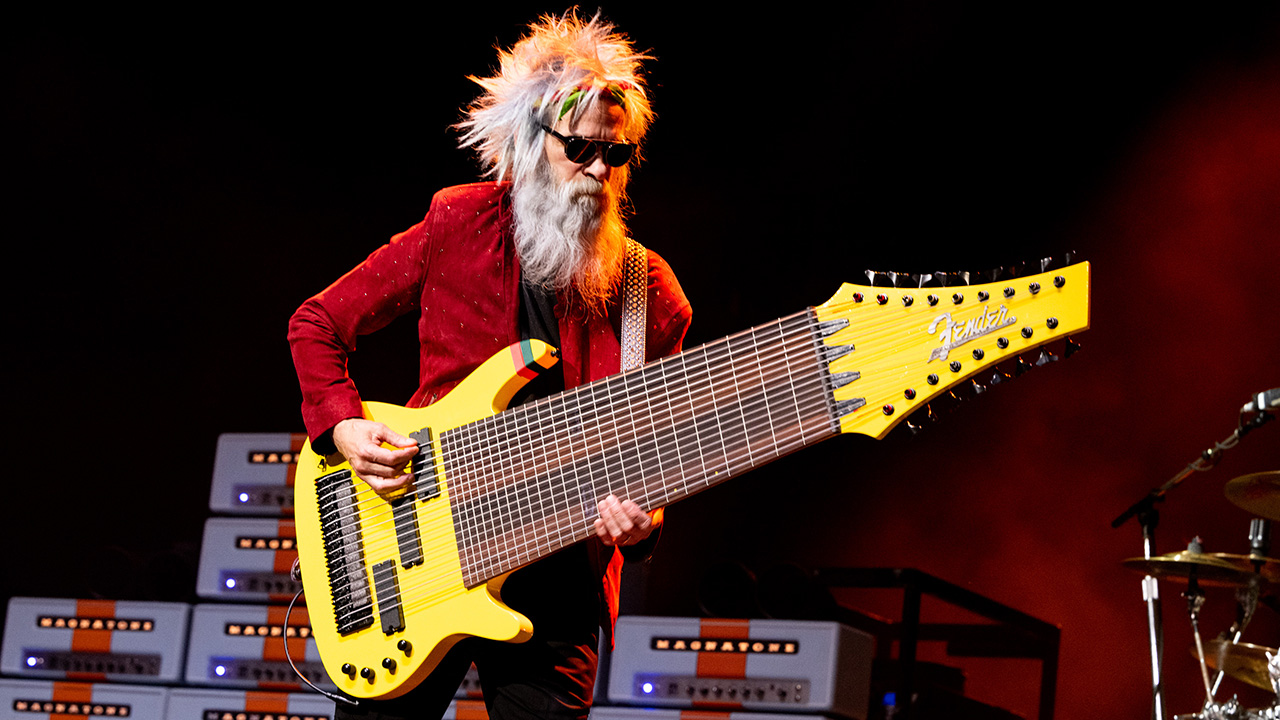
Before taking over low-end duties from the late Dusty Hill in ZZ Top, Elwood Francis was a DIY punk who traveled the world as a tech for some of rock’s biggest stars. With an affinity for Frank Zappa and a knack for tearing into guitars with reckless abandon, Francis worked with Joe Perry, Steve Vai, Izzy Stradlin and Gilby Clarke before a case of burnout led him to step away from the industry.
But when Billy Gibbons came calling, it led to a wild adventure that’s seen Francis go from restringing “pain in the ass” fuzzy guitars to brandishing a 17-string bass for ZZ Top. “I don’t know if I can put it into words,” he says. “It’s just a weird feeling stepping into that role.
“I stepped away from social media because, man, I’m not the most confident person, and Dusty was immensely talented. All I gotta say is the fans have been really cool about it.
“If there had been too much backlash, I would not be doing it. I wouldn’t be able to handle it – I’m just trying to help out. It was never my intention to play bass in fucking ZZ Top.”
You’re playing bass now but you’ve always been a guitarist. What drew you to the instrument?
“My mother’s record collection, I guess. She had good records, like Bill Haley and all that. But Frank Zappa was the one that made me really want to play guitar. The way Frank played guitar solos is how they should sound – especially his ’70s output.
“It was such a barrage of notes, and sometimes it was pretty sloppy. Such a barrage and so different. It was a different choice of notes; it just grabbed me. I never would have thought people could reach that. I’m never going to be that good.”
All the latest guitar news, interviews, lessons, reviews, deals and more, direct to your inbox!
Can you remember your first guitar?
“It was a Harmony; the one with the little Hershey bar pickups. I don’t have the guitar, but I’ve still got that pickup. I’ve always taken my guitars apart, painted them, and kinda devalued them in every possible way.”
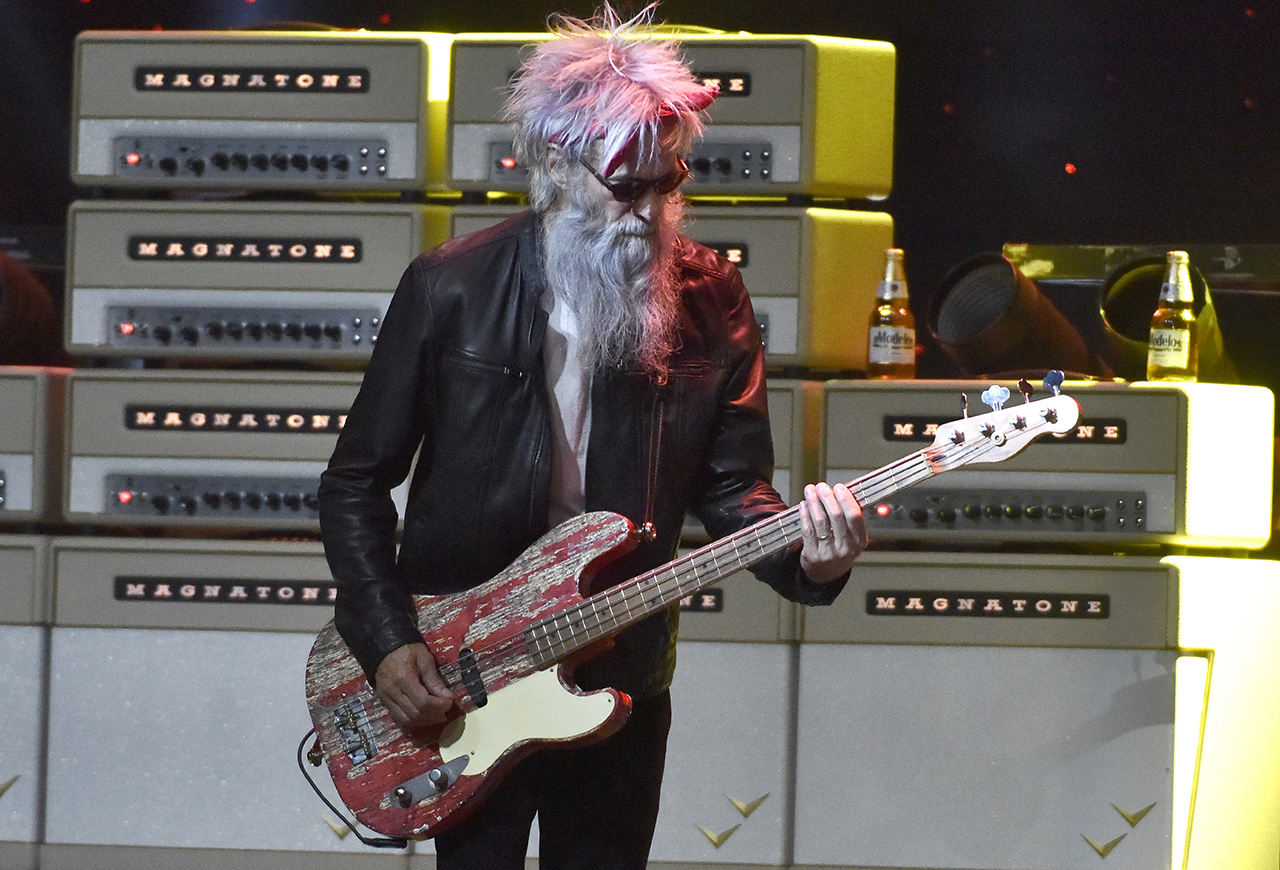
There’s something about making a guitar your own rather than keeping it pristine that appeals.
“You’ve got to make it your own. The value and the resale thing never came to me until much later. When you’re young, all you know is, ‘My fucking Harmony is brown, and I really don’t like the way it looks. I don’t want to play a brown guitar!’”
You started in the punk scene before moving into the guitar tech world. How did that happen?
“My first band was when I was 15, and it was called the Armpits! I was already a sound tech, but I didn’t know there was such a thing as guitar techs. I did road work, setting up gear and I had access to reel-to-reel to record. I’ve still got that – it’s fucking horrible.”
You were Joe Perry’s guitar tech in the ‘80s. What got you into that field?
“It was Joe Perry! I would get little kits, start messing with fuzz boxes and try and modify stuff. I didn’t mind fucking my own shit up, but just from meeting and talking to Joe Perry, that’s how I ended up doing guitars. He asked me to take care of his guitars, and I’m like, ‘Okay, yeah, I can do this.’”
How did you and Joe first meet?
“I was in Boston doing the local scene thing. Joe was doing The Joe Perry Project, and I was with a sound company doing sound. My brother a front-of-house mixer, took a job with The Joe Perry Project, and I would go visit them. I met Joe through my brother and we started talking.”
Joe is very adventurous with gear now, but maybe not as much back then. What were the keys to his rig in those days?
“He was still using his Aerosmith rig with a custom pedalboard that was shaped like a big ‘A.’ For the Rocks tour they had all these racks built, and he would carry two stacks, if I remember correctly.
“The cabinets were on swivels, so they would aim the bottom cabinet at his ears with the top cabinet aimed down. So there was a point on stage where you were in the direct line of fire, and it could be incredibly fucking loud.
I had never seen a Floyd Rose – though I lied and told Steve Vai I had!
“It had a distinct sound. I remember using a lot of Bill Lawrence products, and they even had their guitars wired for three-pin connectors. But when you got in that line of fire where it crossed, it was fucking brutal, man.
“He used that pretty much up until Aerosmith got back together. Then he went to just a couple of pedals – a delay, octave, not much at all. But we had these splitters built to where it was just a pile, you know, a wall of different amps, which sounded fucking awesome.”
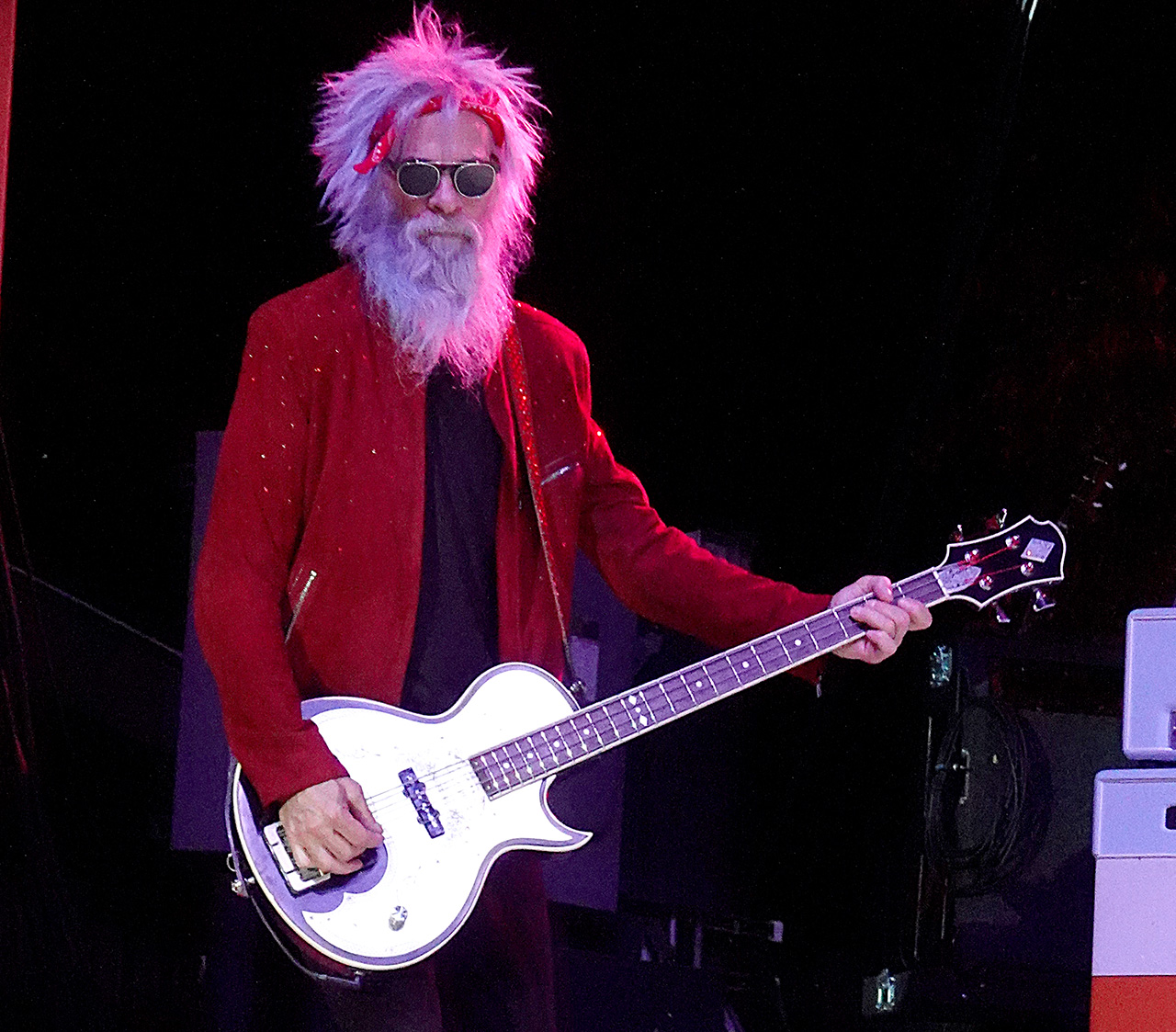
Did Joe offer you any words of wisdom about guitars that stuck?
“We talked a lot. Obviously, I picked things up, whether it was intentional or not. But what I got from Joe mostly is how all his alternate tunings worked. I had no idea so much Aerosmith stuff was in open tunings.
“And just the tone he’s got – I don’t know how to put it into words. There’s just a cool factor, you know? It’s not like he’s teaching, but if you open your eyes and pay attention, you will learn.”
You eventually got to work with Steve Vai. Being a big Zappa guy, picking Steve’s brain must have been fun.
“Steve was fucking awesome. I was one step away, you know, one degree away from Zappa. I went out there all bright-eyed and full of enthusiasm. I bounced between Steve and Aerosmith until there was a conflict; and Joe gave me my start, as much as I loved the Steve Vai job.”
Steve must have been pretty different from Joe.
“They both sound like their personalities. I hear his sound and I hear Joe’s personality, and it’s the same with Steve. They’re so in tune with playing from the heart. But I lean towards Zappa, and Steve had that.
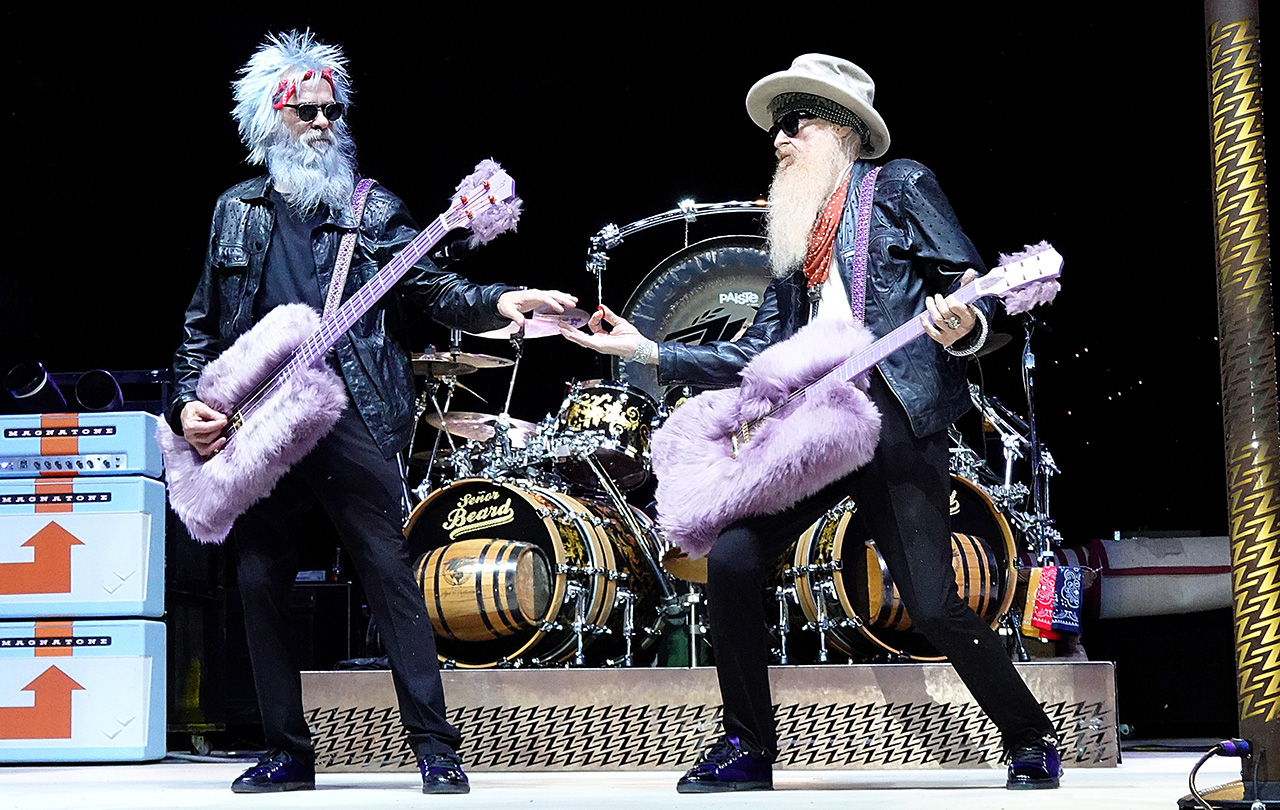
“This was when Floyd Roses were getting big. I had never seen a Floyd Rose – though I lied and told him I had! He’s like, ‘Man, can we make this whammy bar go backward? I want to pull up. Can you dig it out back there?’
“So it was stuff like that; creating something new and being involved with pushing designs. And now, if you fucking look at it, everyone has a floating whammy bar.”
They said, ‘Izzy quit,’ and my checks stopped… a week later they’re like, ‘We got Gilby,’ and the checks started again
Not long after, you worked with Guns N’ Roses as a tech for Izzy Stradlin and Gilby Clarke.
“I met the guys in Guns when they opened for Aerosmith. I liked to smoke pot, so once Aerosmith started doing their no-drugs thing, I had to move on. And Izzy happened to call me and ask me to do his guitars, which was perfect fucking timing.
“I started doing that, then about a year and a half later, Izzy quit. There was a whole lot of sitting around, but they paid me. I sat at home, not knowing what the fuck was going on, but the checks were coming. And finally, they called me and said, ‘Izzy quit,’ and my checks stopped.
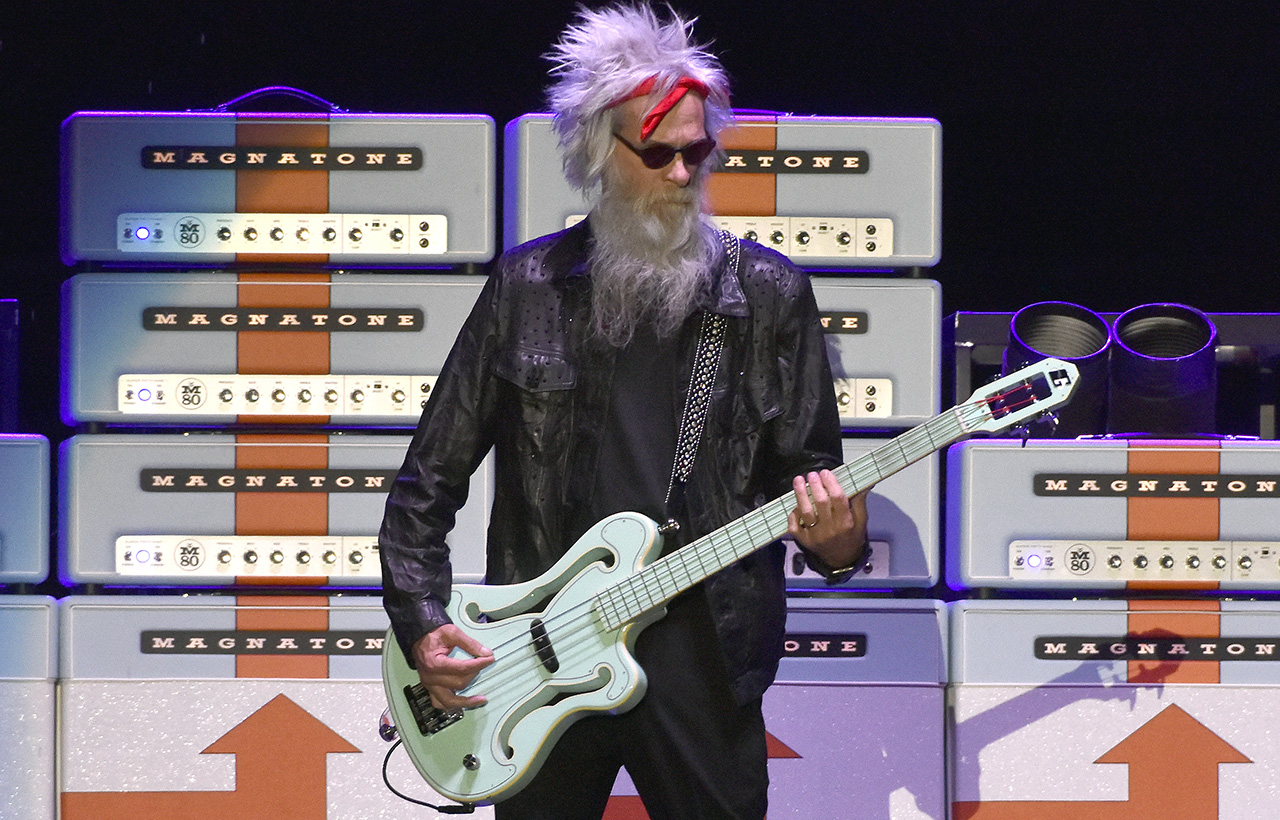
“But about a week later they’re like, ‘We got this guy Gilby,’ and the checks started again. I’m like, ’Okay, cool,’ and I went up there, and Gilby was fucking awesome.
“At that point, it was the eye of the hurricane; then it got a little bit crazier, a little bit weird, and I left. I had enough of touring, I was approaching 30, and I needed to take a break. I took a break until I got a call from Billy; I went down there, and that was it.”
How did you help dial things in for Billy?
“He has a very different way of doing things. You have to learn that way, and you have to learn his touch. He’s playing with .7s, really distorted, and not loud at all. And he plays the guitar so low that if I wear his strap, I can’t even play the guitar in tune.
“I’ll try and make a D chord in the cowboy position, and I’m naturally pulling the strings off the fucking neck! His way is all about homogenization of the guitar tone.”
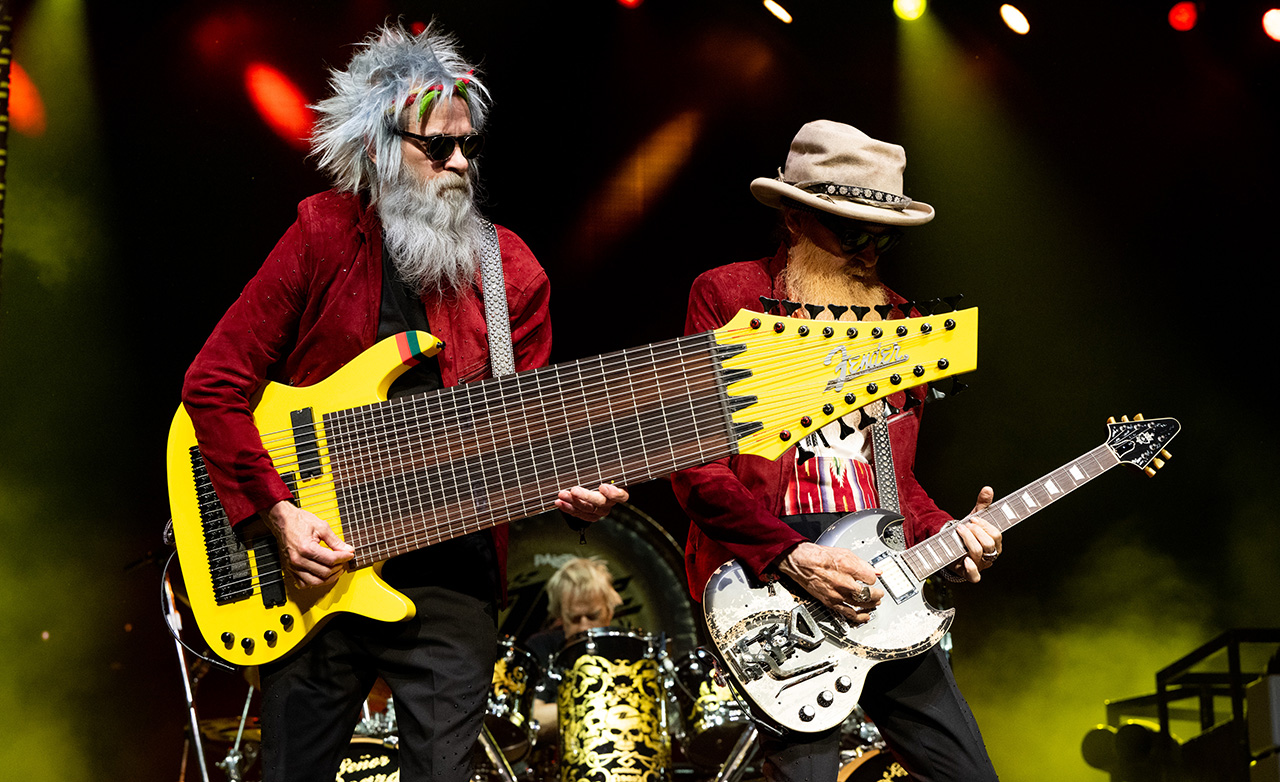
And he’s more into pedals than some people realize.
“Yeah, and he knows exactly what he wants. Steve Vai was on an adventure. Billy does not do that, especially when touring. It’s set a certain way, and we’re going to do it like that, and there’s no stepping off. It’s by the book, whereas Steve was a lot more experimental.”
Is it true Billy loves cheap pedals from Amazon?
“He doesn’t use pedals a lot. They’re just for an extra flavor, so he can change them all the time. And he does buy these cheap Chinese pedals – the smaller, the better. I’ve seen him go through boxes of those fucking pedals!”
I get shit for playing with a pick, but it’s not a big deal…Billy requested I play with a pick
What was the key to working with Dusty?
“I don’t think I did anything with Dusty’s sound. Billy knows what he wants and he has no problem describing it. Dusty wouldn’t tell us what to do; he was just like, ’Give me my bass and let me perform,’ while Billy was thinking about other things.”
After Dusty passed, was there any trepidation about stepping in on bass?
“When I first started doing it, Dusty was just sick and going home for a few weeks. It was entirely different; I was just helping out. I didn’t have to worry about the weight of the crown because I was just helping.
“They pulled me aside and said, ‘Can you honestly say you can’t play his parts?’ I said, ‘I can do it, but I don’t think people would enjoy me doing it.’ They said, ‘You can cover him for a few weeks.’
“Originally, it was going to be three weeks, but it didn’t turn out that way. We’d done some gigs when Dusty passed; and by that time, I wouldn’t say I was comfortable – because I’m still not fucking comfortable.
“I had a piece of paper on the rise the first two shows for if I got in trouble; and by the third show I got rid of that and just did the show.”
What’s it been like stepping into that role?
“It’s just weird. Dusty is their bass player. I’m not the bass player. I’m not in the band. I’ll never be in the band. I shouldn’t be in the band. It’s Dusty’s thing. Sure, I’ll still play with them, but it’s a weird thing, man. I get shit for playing with a pick, but it’s not a big deal.
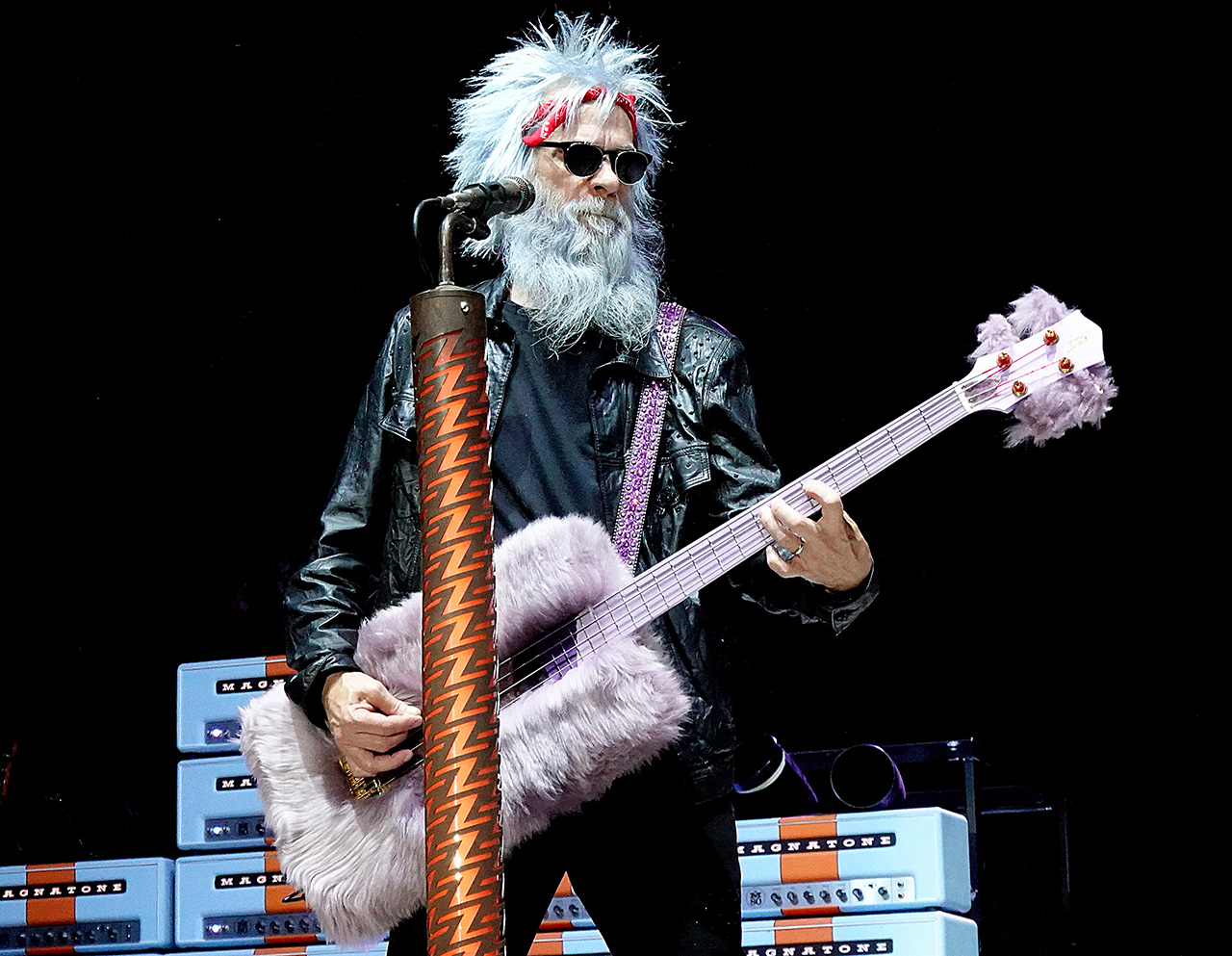
“Billy requested I play with a pick. So right off the bat, things are different, because not only did Dusty play with his fingers, but he was a master at it. His fingers were misshapen through a lifetime of playing bass. He could play like a machine gun with three fingers, and I’ll tell you what – I’ve had problems with some of those things.”
You’ve been playing with a pretty wild 17-string bass here and there. What’s the story there?
“I did it to myself… I hate playing that fucking bass! I found it late at night while internet surfing on one of those Chinese websites. I couldn’t believe they were making something like that.
We decided to keep all the strings on it because it’s even more absurd… the guitar tech barely got the thing ready for the show
“I took a screenshot and sent it to Billy, saying, ‘We should order one of these and I’ll play it. It’ll be hilarious.’ Three fucking months later, we fucking got it. It came in all the way from China, and Billy pulls out this big-ass yellow 17-string bass and he’s like, ‘Okay, we’ll play it for a song, right?’ I said, ‘Yeah, I guess I can do this.’
“We decided to keep all the strings on it because it’s even more absurd. Man, the guitar tech barely got the thing ready for the show.
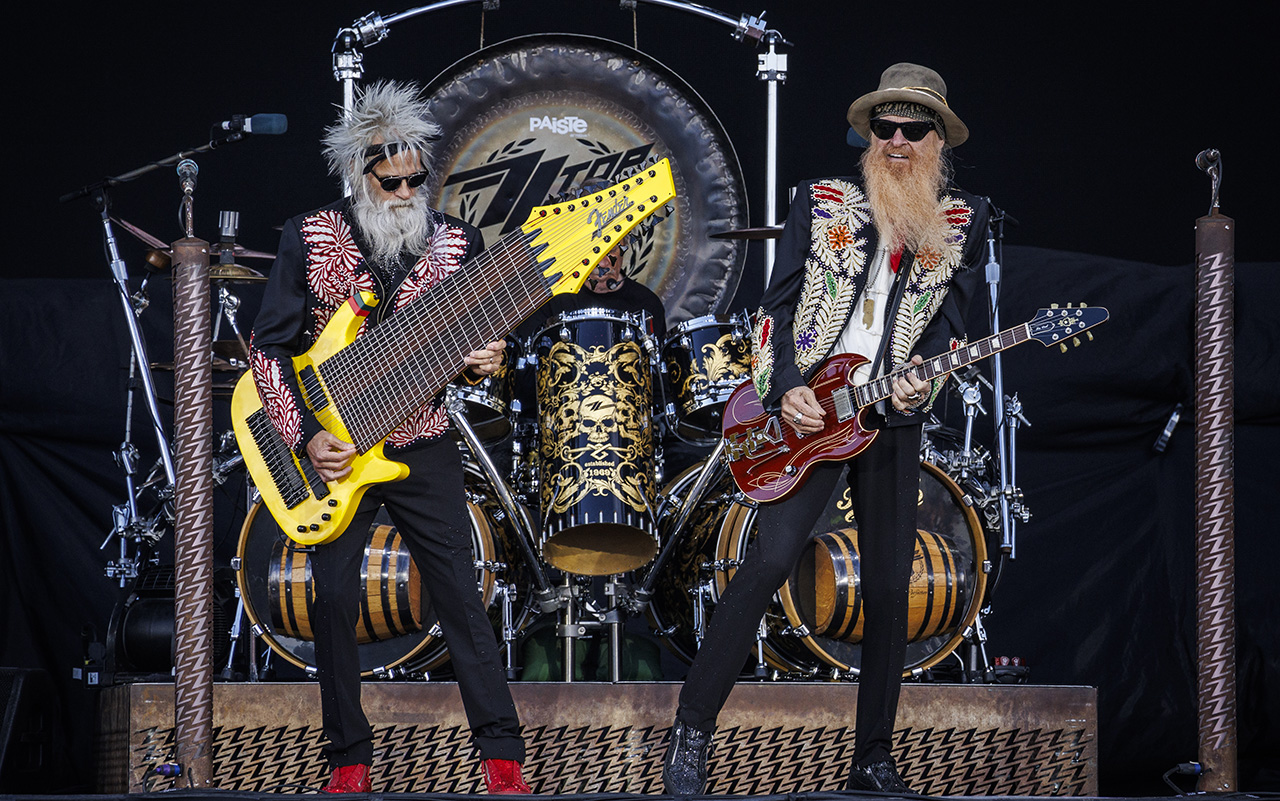
“We don’t do soundchecks; I didn’t even play the guitar until the first time, so it was a baptism by fire while we were out on stage. I was like, ‘God damn, this thing is hard to play!’
“I was seriously struggling – you don’t always know where you are, and if you look at it from the bottom, it’s a big blank neck; I was having trouble finding the frets to play.
“Once it was over, I was like, ‘Okay, cool. Hope everyone laughed.’ I thought it was over – but the son of a bitch went viral, and I woke up to all these messages and links to all this fucking bullshit.
“I’m like, ‘Great… now I got this reaction, Billy’s never going to not let me play it.’ And now, at this point, more people ask me about the 17-string bass than they do the fuzzy guitars!”
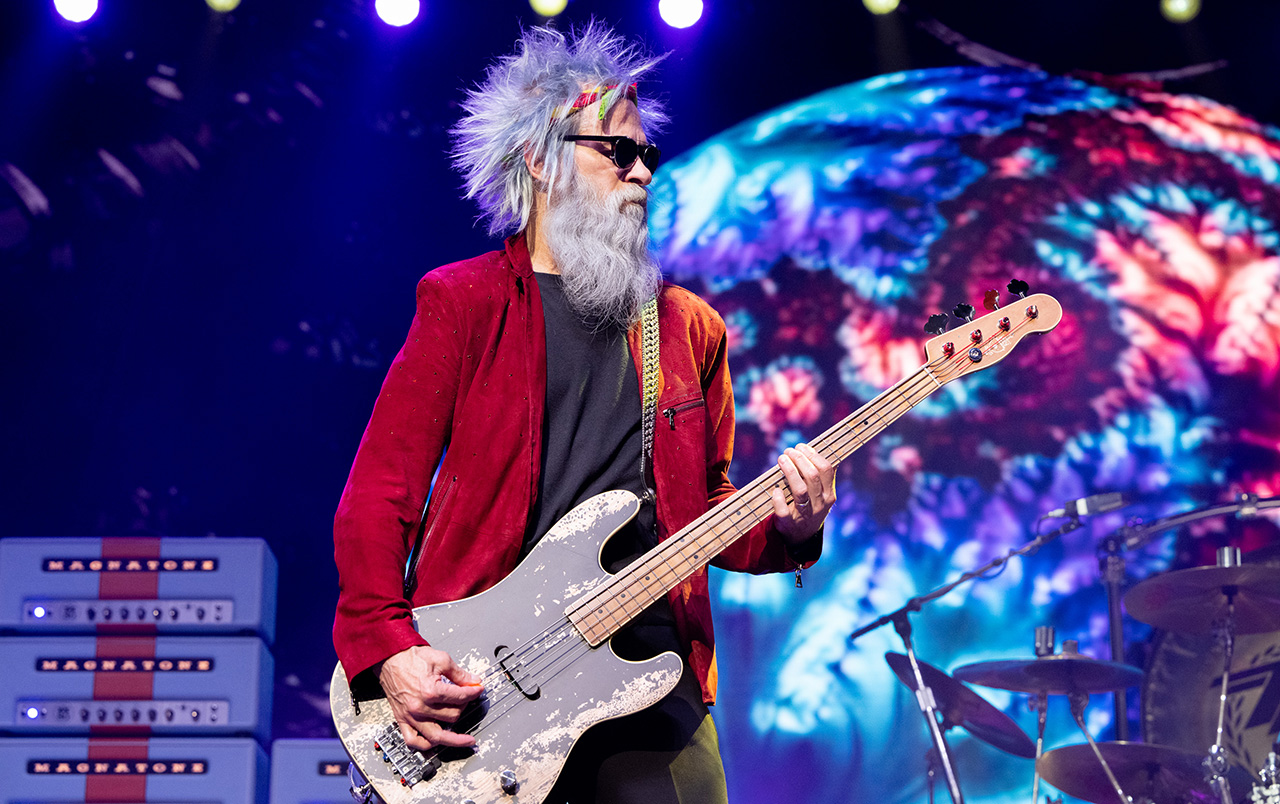
The fuzzy guitars must be a hell of a challenge too.
“The biggest challenge with those is changing the strings. You would not believe what a pain in the ass that is. Playing them is okay, and it’s just for one song. With the 17-string bass, I was thinking, ‘I’ll never have to play it again’ – but now I’ve got to play it.”
ZZ Top is set to get back on the road, but are there plans for any new music?
Billy says he wants to do another record, but officially, I’m not part of that
“We’re touring at least up until November. As for new music, I can only repeat what Billy has said: there are songs with Dusty on them in the can. I don’t know anything more than that.
“Billy says he wants to do another record, but officially, I’m not part of that. I just know what Billy has said; I can’t talk about what will or won’t happen other than that.”
- ZZ Top head back out on tour starting August 9.
Andrew Daly is an iced-coffee-addicted, oddball Telecaster-playing, alfredo pasta-loving journalist from Long Island, NY, who, in addition to being a contributing writer for Guitar World, scribes for Bass Player, Guitar Player, Guitarist, and MusicRadar. Andrew has interviewed favorites like Ace Frehley, Johnny Marr, Vito Bratta, Bruce Kulick, Joe Perry, Brad Whitford, Tom Morello, Rich Robinson, and Paul Stanley, while his all-time favorite (rhythm player), Keith Richards, continues to elude him.



